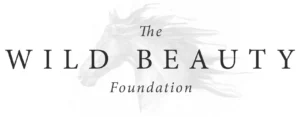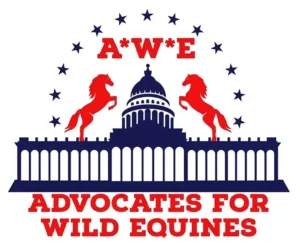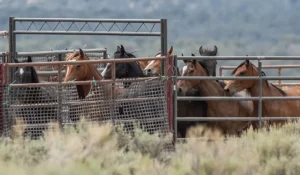Press Release




- For Immediate Release:
- Contact:
- Scott Beckstead
- 541-530-3460
- Email Scott here
Equine groups call for suspension of BLM helicopter roundups of wild horses during Western heatwave
Forecasts call for temperatures in the Antelope Complex area to be in the high 90’s through the weekend.
As Western states brace for a searing summer heatwave, three advocacy groups, Animal Wellness Action, The Wild Beauty Foundation, and Advocates for Wild Equines, called on the Bureau of Land Management to suspend its ongoing helicopter roundup operations in Nevada, citing threats to the health and safety of mustangs being targeted by the agency for removal from their rangeland homes.
The BLM is currently targeting more than 3,000 wild horses of the vast Antelope Complex in Nevada in a roundup operation that began July 9 and involves two separate helicopters. According to the BLM’s daily gather reports from the operation, two horses have already lost their lives in the operation; a foal died of colic after arriving at the holding facility, while a 4-year-old mare broke her neck while being stampeded into the agency’s traps.
“If the BLM is serious about adhering to its own animal welfare rules, it will immediately suspend its operations in the Antelope Complex until the weather turns and temperatures drop,” said Scott Beckstead, director of campaigns for Animal Wellness Action and an equine welfare specialist. “Chasing these animals, including foals, heavily pregnant mares, and elderly animals, through extreme heat will inevitably lead to their suffering and deaths. We call on the BLM to do the right thing and ground the helicopters until conditions improve.”
 WilsonAxpe Photography / We Animals Media
WilsonAxpe Photography / We Animals Media
The BLM claims to adhere to its Comprehensive Animal Welfare Program (CAWP) in its wild horse and burro operations. Because the CAWP is a set of voluntary guidelines and is not legally enforceable, abiding by those guidelines is a matter of agency discretion. Public observers of the BLM’s operations, including the helicopter operations and conditions inside the agency’s holding facilities, have shown that CAWP violations are a routine occurrence, despite agency assurances to the contrary.
The CAWP addresses conducting wild horse and burro gather operations in extreme temperatures where stating, “Horse captures must not be conducted when ambient temperature at the trap site is below 10ºF or above 95ºF without approval of the Lead COR/COR/PI. Burro captures must not be conducted when ambient temperature is below 10ºF or above 100ºF without approval of the Lead COR/COR/PI. The Lead COR/COR/PI will not approve captures when the ambient temperature exceeds 105 ºF. (major).” Forecasts call for temperatures in the Antelope Complex area to be in the high 90’s over through the weekend.
“Having spent years documenting wild horse roundups, which are at their very core cruel and antiquated practices, the idea of forcing terrified wild horses to run in extreme heat is the definition of animal cruelty,” said Ashley Avis, president and founder of The Wild Beauty Foundation. “If the Bureau of Land Management proceeds with rounding up horses at these temperatures, it only reinforces the carelessness, mismanagement, and disturbing ethos of the agency – clearly opting to prioritize the financial interests of the helicopter contractors over animal welfare. I hope the BLM does the right thing and immediately suspends these operations.”
Video of the operations posted by wild horse advocacy groups monitoring the Antelope Complex operations have documented terrified horses desperately trying to escape the helicopters and the traps, with stallions somersaulting over fence panels and mares desperately trying to return to foals that have fallen behind in the stampede. The distress experienced by the horses while they are chased by the helicopters would be compounded by extreme heat and will inevitably lead to more deaths.
“Advocates for Wild Equines National is opposed to wild horse and burro roundups, but especially summer roundups altogether,” said Britta Starke, legislative liaison for Advocates for Wild Equines. “As it relates to summer roundups, the scientific data is clear that horses can die from the combined effects of sustained exertion and high temperatures, and therefore any roundup scheduled during extreme summer temperatures should be suspended or canceled. Any injury or death to a horse should be considered a major CAWP violation and grounds for investigation of the BLM by an outside source.”
Center for a Humane Economy is a Washington, D.C.-based 501(c)(3) whose mission is to help animals by helping forge a more humane economic order. The first organization of its kind in the animal protection movement, the Center encourages businesses to honor their social responsibilities in a culture where consumers, investors, and other key stakeholders abhor cruelty and the degradation of the environment and embrace innovation as a means of eliminating both. The Center believes helping animals helps us all. Twitter: @TheHumaneCenter
Animal Wellness Action is a Washington, D.C.-based 501(c)(4) whose mission is to help animals by promoting laws and regulations at federal, state and local levels that forbid cruelty to all animals. The group also works to enforce existing anti-cruelty and wildlife protection laws. Animal Wellness Action believes helping animals helps us all. Twitter: @AWAction_News
The Wild Beauty Foundation is a 501c3 nonprofit organization dedicated to illuminating key issues wild and domestic horses are facing today through film, education, advocacy, and rescue. WBF recently co-produced the award-winning documentary, Wild Beauty: Mustang Spirit of the West, which debuted to the public in May 2023.
Advocates for Wild Equines was founded in September 2021 and seeks to bring together people from diverse backgrounds and with various interests including, wild horse and burro protection, preservation of public lands, wild-equine rescue, and climate change. Our grassroots coalition of individuals and organizations welcomes all who share our vision of ending roundups and equine slaughter, as well as rewilding all horses and burros currently being warehoused in holding pens by the U.S. Bureau of Land Management.
Breaking News
FDA’s Roadmap to Phase Out Animal Testing Will Create a More Humane, Scientifically Rigorous, and Efficient Health Delivery Model for the Nation
The FDA Roadmap will unleash 21st-century technology that will benefit patients desperate...
Read MoreLouisiana Mother on Capitol Hill Today After Daughter’s School Milk Incident Sparks Outrage and Demand for Reform
Press Release or Coalition of 200 organizations calls on Congress to pass...
Read MoreAs Bird Flu Epidemic Wreaks Havoc, U.S. Senators Kennedy and Booker Introduce FIGHT Act to Crack Down on Animal Fighting Trafficking and Other Crimes
Bipartisan legislation attracts nearly 800 endorsers, including Animal Wellness Action, the National...
Read MoreFDA Commissioner and Congress Speaking Same Language to Reduce Animal Testing in Drug Development
HHS Secretary Kennedy and FDA Commissioner Makary signal movement away from animal...
Read MoreAnimal Wellness Action Assists Pasquotank County Sheriff in Cockfighting Bust
Elizabeth City, N.C. — Animal Wellness Action assisted the Pasquotank County Sheriff’s...
Read MoreArkansas Senate Committee Crushes House-Approved Bill That Would Have Decriminalized Core Cockfighting Activities
Press Release Senate committee preserves the state’s anti-cockfighting law after witnesses exposed...
Read More